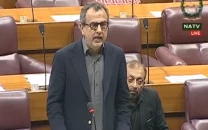K-P defends mining bill in white paper
CM Gandapur clarifies no provincial powers being handed over

The Khyber-Pakhtunkhwa government on Tuesday issued a white paper on the proposed Mines and Minerals (Amendment) Bill 2025, detailing the main features and goals of the legislation.
Chief Minister Ali Amin Gandapur clarified that no powers of the provincial government were being transferred under the proposed legislation, terming the opposition to reforms a result of "misconceptions".
He said that a vested-interest mafia may be resisting the changes for personal gain.
Meanwhile, according to the white paper, the proposed amendments aim to harmonise mineral laws with those of other provinces and the federal government, attract large-scale domestic and international investment and improve transparency through a digital mining system.
Meanwhile, a mineral investment facilitation authority would be established, and mineral titles and licensing procedures would be streamlined via digitisation.
Under the legislation, the licensing term has been reduced to three years to ease lease acquisition, and an independent appellate tribunal will be formed to ensure impartial and timely justice.
The department will also be bound to develop a geological database. A special force would be constituted to curb illegal mining through machinery confiscation and stricter penalties.
Existing leases and pending applications will remain unaffected by the new legislation.
Investment limits will be clarified for merged districts, small-scale and artisanal mining.
"We've increased provincial revenue through policy reforms in the minerals sector," Gandapur said. "Illegal mining was ongoing for 76 years in gold-rich Charsadda sites, yet no past government attempted to stop it."
In a related development, Pakistan Tehreek-e-Insaf (PTI) has formed a three-member committee to conduct a thorough review of the bill following concerns raised by party members and the opposition.
The committee is tasked with reviewing each clause, identifying ambiguities or flaws and making recommendations to enhance transparency, uphold provincial autonomy, respect public rights and ensure the law serves the broader public interest.




















COMMENTS
Comments are moderated and generally will be posted if they are on-topic and not abusive.
For more information, please see our Comments FAQ